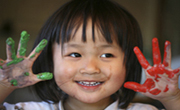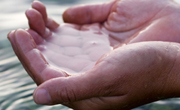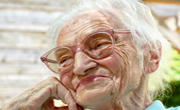Helping Horse Leadership Project
In June 2001, chose a project at Helping Horse Riding Center. This center provides therapeutic horseback riding for physically, mentally and/or emotionally disabled persons. This WorldLegacy Leadership project provided improved landscaping, a permanent outdoor handicapped-accessible bathroom, and a covered riding area.
Volunteers Help Helping Horse
July 9, 2001
By Jamila Vernon; STAFF WRITER
At the end of a winding gravel road just outside Raleigh’s city limits sits a small barn and a couple of horses that have brought together more than 200 people in the name of volunteerism.
Helping Horse, a nonprofit group that has provided therapeutic horseback riding for disabled children since 1989, has relied on donations and the goodwill of people throughout the Triangle to expand and improve the program.
Today, after five years of dreaming and nearly three weeks of hard work, the organization will open its new training facility and an outdoor handicapped-accessible restroom that will benefit the program’s 30 participants.
The dream became a reality with the help of The WorldLegacy’s 27-member NC38 team. They sought out most of the donations and volunteers for the project, which was completed under a two-month deadline.
The WorldLegacy is a Chapel Hill-based personal coaching firm that teaches people to be leaders through training courses and a chosen community service project.
James Hemby, a Helping Horse board member, said he never expected the work to be done so quickly.
“Before you put some energy and elbow grease behind it, it is just a concept,” he said. “You have to go through conception and design and then you have to have permits. The energy and enthusiasm they brought to the project was beyond our expectations.”
NC38 member Paula Berardinelli said Helping Horse had the general concept for the facility, and NC38 helped put it on paper. “One of the members on our team was an architect,” she said. “Once Helping Horse saw their words in a picture, their vision became real.”
Several businesses and construction companies were contacted and asked to contribute. Every piece needed to complete the project was supplied, from bathroom fixtures to shrubbery.
“People truly do want to help,” said NC38 member Deanna Dinnis. “Sometimes they just need to know what’s needed.” Some of the major contributors were Carolina Builders Corp., Ferguson Bath Kitchen & Lighting and the Junior League of Raleigh. And people who couldn’t give materials put in long hours and plenty of hard work.
“It probably took 1,000 to 1,500 man-hours,” said NC38 member Steve Hamilton, whose daughter is a rider in Helping Horse. “We worked three days one week. … Sometimes we worked six. … When people could get off of work, they did.” Hamilton’s daughter, Marla, was the reason NC38 became involved in the project in April. Dinnis said the group saw the good work the organization was doing and immediately joined in. “We sort of had an emotional attachment to this one,” she said. Helping Horse is one of more than 500 therapeutic riding centers across the country that aims to strengthen riders who have disabilities such as cerebral palsy and learning and sensory impairments.
“Physically, the horse will help stimulate muscles in the torso and legs,” Hemby said. “It also helps with balance and coordination. In order to establish balance, you have to stretch muscles.”
The regular season runs from Sept. 1 to May 30 during the traditional school year. Lessons are held four nights a week for children ages 4 and older. The organization has more than 80 active volunteers and eight horseback riding instructors who come at least once a week. “Some people come out because they want to give back to the community,” Hemby said, “or they were around horses in their youth.”
The eight horses that are used for therapy were donated and carefully selected to fit the needs of the children. “We get a lot of leads on people who want to give their horses to us,” Hemby said. “They have to be calm and very well-tempered. We look for what they call dead-broke horses. Safety is the utmost premium.” Each rider is accompanied by at least one instructor and three volunteers who act as side-walkers. “We take it very slow and easy until [the riders] get comfortable,” Hemby said. “Some people in the program have gone on to ride in a commercial stable.”
This past weekend, 11 riders from the program competed in the state’s equestrian Special Olympics. But the main goal of the program is to have fun and learn from each other, Hemby said. In the meantime, Helping Horse is making plans for further improvements, which include re-roofing the barn and covering a riding area.
Dinnis believes the group can be a tool for bringing the community together. “Part of these projects is that they never end. … It will still be there and benefiting the human race in some area.”
Reprinted with Permission of The News & Observer of Raleigh, North Carolina.







